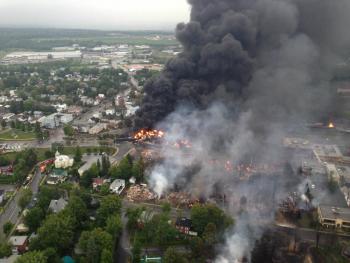Just as the election started in the dead of winter, its end has brought with it the hints of spring.
And, with the melt of the spring thaw, ghosts are awakened from their resting spaces. They ask, “what about us?”
Throughout the 33 days of the election campaign, it seems that the tragedy at Lac-Mégantic has been forgotten. Very little was said by the leaders about rail safety and crude oil transportation. Instead, the three major parties based their economic plans on more of the same.
Only Québec Solidaire promised to take aim at our dependence on oil. Their economic platform was premised on how to stop our collective addiction.
I guess I was naïve. I thought that a major disaster with many deaths would be what it took to shake us out of this oil-induced stupor. I thought that if there was a spectacular failure of safety regulations that collided at once where dozens of people would be killed, maybe politicians would reconsider this whole experiment. I hoped that it wouldn’t have to come to that.
I thought that the next election campaign after the disaster would be an opportunity to hold politicians to account for their hand in dozens of errors that collided to create such a spectacular disaster.
Instead, no. Instead, the spring thaw whips up oil that had leaked into the Chaudière river system, threatening the drinking water of Lévis and none of the major party leaders comment. Lévis, the town that relies on that very oil to run its refineries.
How long does it take the snake to realize he’s eating his own tail before it’s too late?
Water contamination from oil from the Lac-Mégantic derailment wasn’t a major story in this election. Preventing another disaster was not one of the highly debated topics in the media. Three of the four parties support pipelines. The Liberals, the PQ and the CAQ tried to out-resource-extraction each other to appeal to electors as economically-sound parties.
Only Québec solidaire’s candidates seemed to oppose oil contamination of the water system. Only Québec Solidaire asked: are we crazy? We’re basing our economic future on the continued destruction of the earth. People should not have to die, people should not lose access to clean drinking water to sustain our society. We have other options.
No progressive should imagine that an election is a time where radical social change is possible. Instead, it should be viewed as a time to reflect on how entrenched and popular are notions that we fight to challenge, both rhetorically and as they’re enacted on the ground.
But for progressives who are concerned about our environment, the Québec election is an interesting barometre. 18 months ago, the PQ fought to replace the Liberals. Part of their strategy was to focus on various environmental initiatives: close down the nuclear power plant Gentilly-2, ban fracking and stop the Liberal Party’s Plan Nord.
But now, as they struggle to hold on to power, the PQ’s veil of environmentally friendliness is gone. Their $150 million plan to exploit resources on Anticosti Island and support for a Liberal-esque Plan Nord is clear that they’re driven by populism rather than a desire to stop our collective destruction.
Marois stopped in Lac-Mégantic twice during the campaign. Rather than talking about what actually caused the disaster, she promised to help the town rebuild its business core. Their local candidate is a Liberal and Marois wants that riding. On April 4, another derailment happened at Lac-Mégantic, this time, the result of built up snow and ice on the tracks.
Unless the environment helps get someone elected, the major parties aren’t interested and tonight’s results won’t change any of this. Unless Québecers swing and elect a Québec Solidaire majority, every other permutation possible will guarantee more of the same. Activists will have to continue to build support on the ground to stop our dependence on oil.
We cannot continue along this path. Or, we can, but more people will get sick and more people will die. Those of us in good conscience who don’t believe that our economic success should come with the sickness and death of others know we cannot continue along this path.
Unfortunately, those who stand to profit from the current economic arrangement, think we can continue.
Tomorrow morning, as our Facebook feeds can become less full of election news, we have to re-start our work and continue to build strong communities to take on the damage that industry inflicts on our land, our air and our water.



